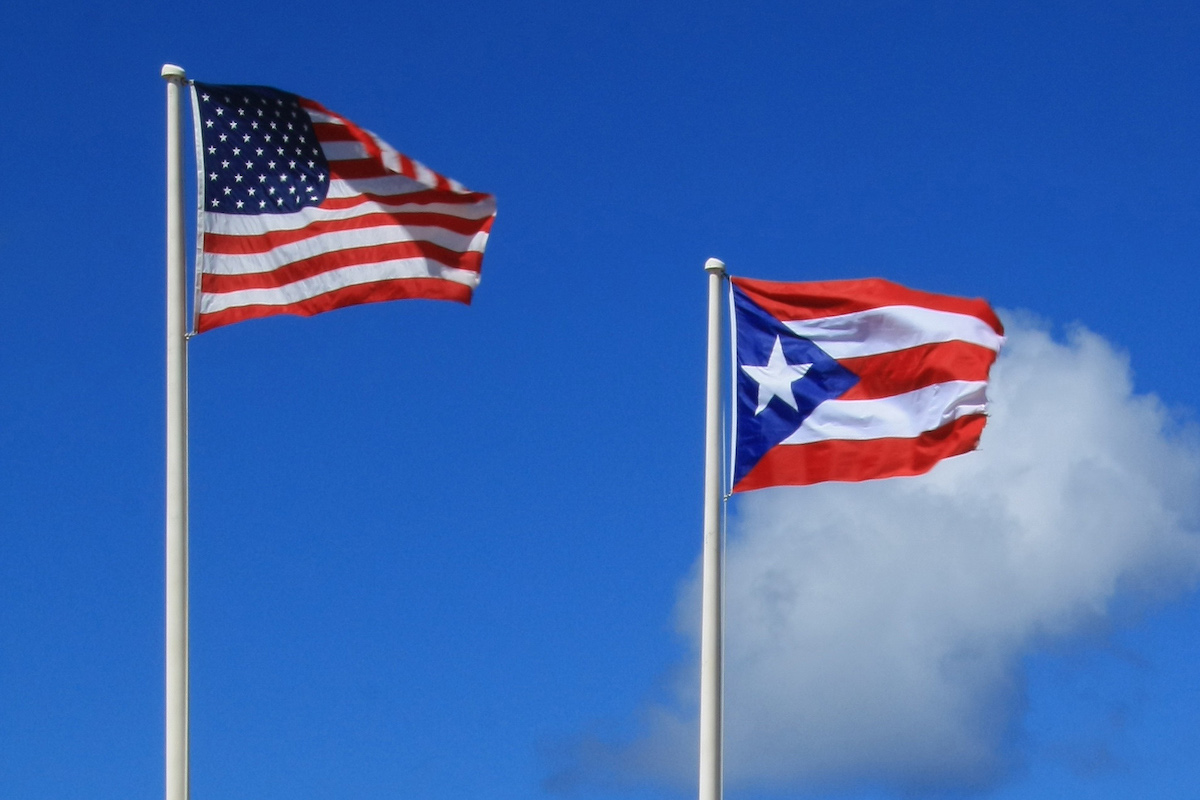

The U.S. flag, left, flies next to the colonial flag of Puerto Rico.
SAN JUAN — On Thursday the U.S. Supreme Court ruled that Puerto Rico’s unelected fiscal control board has “sovereign immunity” and does not have to answer journalists’ requests for government documents.
The 8-1 vote reversed a court of appeals ruling that determined that the Financial Oversight and Management Board for Puerto Rico (FOMBPR) needed to comply with records requests from the Centro de Periodismo Investigativo (CPI), which has reported extensively on the archipelago’s fiscal crisis and the ensuing debt restructuring.
The FOMBPR, known by Puerto Ricans as “La Junta,” was created by the Puerto Rico Oversight, Management, and Economic Stability Act (PROMESA) in 2016 to deal with the archipelago’s more than $70 billion debt. The board has repeatedly come under fire due to conflicts of interest between board members and private businesses, along with the crippling austerity measures it has passed to satisfy Puerto Rico’s creditors.
The CPI had requested several documents, among them communications between board members and the federal and Puerto Rican governments. While the FOMBPR had already given the CPI over 18,000 documents, there were still an additional 20,000 documents they were looking for.
The board argued it was part of the government of Puerto Rico, which shielded it from federal lawsuits. The 1st U.S. Circuit Court of Appeals in Boston had responded by saying PROMESA denied the board that immunity.
The FOMBPR then argued before the Supreme Court that Congress’s intent to waive immunity was not “unmistakably clear,” as the Supreme Court has held as a standard in previous rulings.
“Nothing in PROMESA makes Congress’s intent to abrogate the Board’s sovereign immunity unmistakably clear. The statute does not explicitly strip the Board of immunity or expressly authorize the bringing of claims against the Board,” Justice Elena Kagan wrote for the majority. “We therefore reverse the judgment of the court of appeals and remand the case for further proceedings consistent with this opinion.”
Clarence Thomas was the only dissenting opinion. Notably, Sonia Sotomayor, who is Puerto Rican herself, joined the majority.
“The Oversight Board welcomes the U.S. Supreme Court’s decision today to affirm the Oversight Board’s sovereign immunity as an entity within the Government of Puerto Rico,” the FOMBPR said in a written statement.
Over 30 news organizations, nonprofits and the presidents of the Puerto Rican legislative chambers had joined the case as friends of the court, worried that the FOMBPR was not operating under the same public scrutiny as the insular government. The court’s decision has seemingly confirmed their fears.
“The consequences of this Supreme Court decision are perverse for the people of Puerto Rico,” Carla Minet, CPI’s executive director, said in an article published by the nonprofit journalism organization.
CPI’s law team is currently reviewing courses of action following the ruling.
Many have decried the decision will limit Puerto Ricans access to information about the FOMBPR and essentially allow it to work in the shadows.
“This is an injustice to Puerto Ricans, because throughout its six years of existence, FOMB has operated with impunity under a cloak of secrecy and has disregarded its responsibility to inform and take into account the will of the Puerto Rican people,” Lourdes M. Rosado, president and general counsel of LatinoJustice PRLDEF, said in a written statement.
Previously, the board had been challenged by a Puerto Rican labor union, and a hedge fund that had invested in bonds took the board to court to argue it violated the U.S. Constitution’s Appointments Clause, as its members were not nominated by the president or confirmed by the Senate. At the time, the Supreme Court unanimously rejected this argument, claiming the FOMBPR exercised local and state powers, not federal powers, and therefore was not required to follow the clause.
“Because of today’s intervention by the Supreme Court, the oversight board will be allowed to continue ignoring the government transparency laws enshrined in Puerto Rico’s constitution,” Neil Weare, co-founder and co-director of Right to Democracy, a nonprofit that aims to confront colonialism in U.S. colonies, said in a written statement.
Some have labeled the ruling as part of the “New Insular Cases,” referring to a series of Plessy-era decisions that denied equal rights to the 3.6 million residents of Puerto Rico, Guam, the U.S. Virgin Islands, the Northern Mariana Islands, and American Samoa.
La decisión que publica hoy el Tribunal Supremo de Estados Unidos en el caso de acceso a información instando por el CPI se suma a al portafolio de los “Nuevos Casos Insulares” donde ese foro judicial ha redefinido los contornos jurídicos de las relación políticas entre PR y EEUU
— José J. Lamas (@jjlamas) May 11, 2023
***
Carlos Edill Berríos Polanco is the Caribbean correspondent for Latino Rebels, based in San Juan, Puerto Rico. Twitter: @Vaquero2XL



[…] Medicaid, the have an effect on of the jones act (which gave Puerto Ricans US citizenship), and the un-elected junta—the Financial Oversight and Management Board for Puerto Rico that necessarily laws the […]
[…] for Medicaid, the impact of the Jones Act (which gave Puerto Ricans U. S. citizenship), and the un-elected Junta—the Financial Oversight and Management Board for Puerto Rico that essentially rules the […]
[…] for Medicaid, the impact of the Jones Act (which gave Puerto Ricans U. S. citizenship), and the un-elected Junta—the Financial Oversight and Management Board for Puerto Rico that essentially rules the […]
[…] Medicaid funding, impact of the Jones Act (which gave Puerto Ricans US citizenship), and the Junta not elected-THE Puerto Rico Financial Supervisory and Management Board which basically rules the island – […]
[…] for Medicaid, the impact of the Jones Act (which gave Puerto Ricans U. S. citizenship), and the un-elected Junta—the Monetary Oversight and Administration Board for Puerto Rico that primarily guidelines the […]
[…] for Medicaid, the impact of the Jones Act (which gave Puerto Ricans U. S. citizenship), and the un-elected Junta—the Financial Oversight and Management Board for Puerto Rico that essentially rules the […]